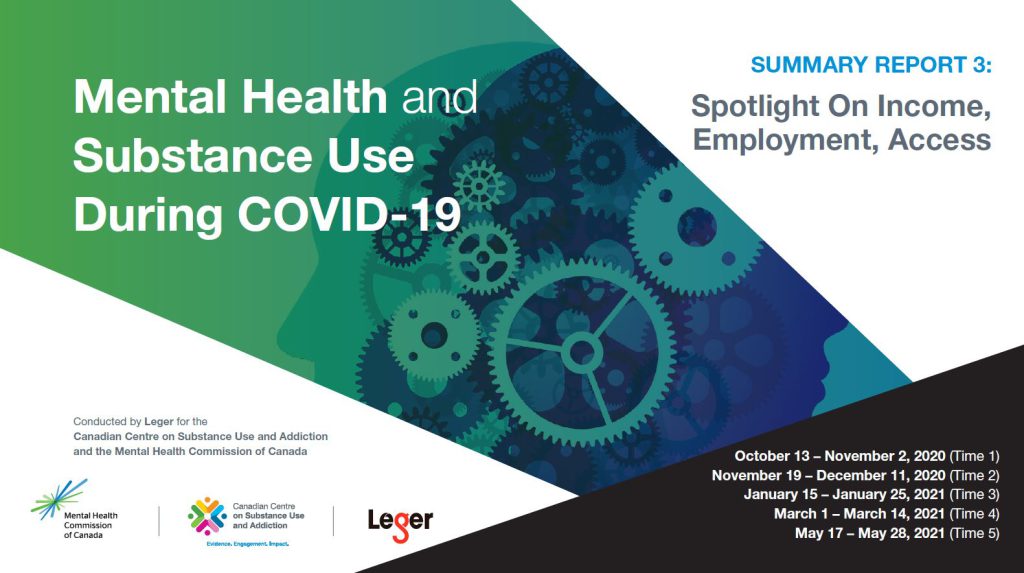It has been over one year since the onset of the COVID-19 pandemic, and not everyone has been impacted equally.
A new report from the series of Leger polls commissioned by the Mental Health Commission of Canada and the Canadian Centre on Substance Use and Addiction highlights the disproportionate negative impact of the COVID-19-pandemic on people living on low incomes, who are unemployed, or who recently lost their jobs.
Key Findings
- People with low income or who are unemployed/laid-off report higher rates of anxiety, depression, suicidal ideation, and increased substance use.
- 1 in 4 people with low income or who are unemployed/laid-off report finances as a top pandemic stress, compared to one in seven in the general population.
- People with low income or who are unemployed/laid-off face more barriers in accessing mental health and substance use treatment services.
- Most common barriers include: financial constraints, help is not readily available, not knowing how and where to get help, and long waitlists.
Context
It has now been over one year since the onset of the COVID-19 pandemic. Over the past year, concerns about catching the virus, feelings of isolation and hopelessness, financial concerns, job insecurity, the trauma of losing a loved one, or a combination of these and other stressors, have certainly affected us all. However, not everyone has been impacted equally.
Since October 2020, the MHCC and CCSA have been tracking the relationship between mental health and substance use over time and across several priority populations. Each time period builds on the results from the first survey and will add to the knowledge about how mental health and substance use might be changing over time. This report includes cross-sectional findings collected over five time periods between October 2020 and May 2021.
Objectives
The objectives of this project are to:
- Track the ongoing impact of COVID-19 on mental health and substance use across several priority populations
- Highlight the intersection between mental health and substance use during the COVID-19 pandemic
- Inform public health policy and the development of resources related to mental health and substance use
Methodology
- Residents of Canada, aged 16 and older, who signed up to complete an online survey via Leger’s online panel, LEO.
- Survey data was collected at five time periods, between:
- T1: October 13 and November 2, 2020 (n=2502)
- T2: November 19 and December 11, 2020 (n=1507)
- T3: January 15 and January 25, 2021 (n=1502)
- T4: March 1 and March 14, 2021 (n=1524)
- T5: May 17 and May 28, 2021 (n=1519)
- As a non-random online survey, a margin of error is technically not reported.
- If the data were collected through a random sample, the margin of error for T1 would be Canada (n=2502) ±2.0%, 19 times out of 20, and for T2, T3, T4, T5 would be Canada (n =~1500) ±2.5%, 19 times out of 20.
- While the sample has been weighted according to age, gender and region using data from the 2016 census, it is not fully representative of the Canadian population and caution should be exercised when comparing results with other surveys.
CONSULT OUR OTHER ARTICLES ABOUT MENTAL HEALTH AND SUBSTANCE USE DURING THE PANDEMIC
- Mental Health and Substance Use During COVID-19
- [WEBINAR] The Relationship Between Mental Health and Substance Use During the Pandemic
- Mental Health and Substance Use During COVID-19: Spotlight on Gender and Household Size

